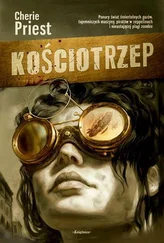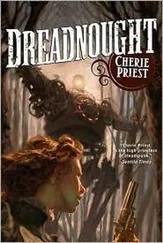“Miss Boyd, I don’t take orders from Mr. Lincoln. You can safely bet I won’t take them from you. ”
Maria Boyd appeared on the verge of losing her temper, but manners prevailed and she forced her composure to override her aggravation. “Again, doctor, that’s your decision. I don’t work for you, and I don’t have to make you happy. I work for Mr. Pinkerton, as do you—Dr. Wellers? And Mr. Epperson, you’re with the Marshals Service, is that correct?” It sounded like a too-desperate attempt to steer the conversation elsewhere, and to Gideon’s intense irritation, it worked.
The marshal relaxed, happy to have a more neutral topic in play. “Henry—just call me Henry, please. And, yes, that’s right. I suppose it was in your dossier from the agency?”
“Yes, because my employer knew you’d be present. Not much love lost between the Pinks and the service, is there?”
“No, ma’am, but this is a special case, and I trust we can all work together like civilized professionals,” he said, casting a quick look at Gideon, who neither melted nor argued. “The U.S. Marshals Service is prepared to cooperate with the Pinkertons, or any other organization which Mr. Lincoln sees fit to involve.”
Something about the strict formality nagged at Gideon’s attention, undermining his words. “I don’t believe you,” he blurted, before he’d really had time to work out why. “I think you’re here on your own time, or at least on your own recognizance.”
Nelson Wellers said, “Now, Gideon, that’s not called for…”
But Henry fidgeted in his seat, flicking glances between Lincoln and Maria Boyd, so Gideon pushed. “Marshals don’t play nice with Pinks. The Pinks only care about Mr. Lincoln here because he pays them—and maybe because the man on top still feels a little guilty about his son’s failings as a security agent; I don’t know. You’re not here on behalf of the service, and I want to hear you admit it.”
“All right, then: No, I’m not. Not exactly,” Henry admitted. “But I believe in ending the war, and Mr. Lincoln has become the foremost face of that effort. If anyone can do it, he can. And I want to help.”
Maria Boyd frowned. “And the Marshal Service doesn’t?”
It was Henry’s turn to shrug. “Yes, of course the service wants to help. As a point of particular interest, the marshals are increasingly interested in the disease threat out on the fronts. Evidence is mounting that we’re looking at something that could cost the Union its impending victory, something worse than illness.”
“Much worse,” Gideon interjected.
“Yes, thank you—and Mr. Lincoln tells me that your research and my suspicions dovetail nicely. The thing is, I’m confident there’s a money connection between the walking plague and certain warhawks in positions of power on both sides of the Mason-Dixon, and the service is not ready to commit to an investigation of people who are allegedly fighting on our side … people who would resent the implications of our interest, and are powerful enough to cause us problems.”
Maria’s frown became more thoughtful. “Warhawks sowing a plague.… That’s a dark theory, Mr. Epperson.”
“But you don’t doubt it, do you? That there are men—and women—capable of manipulating tragedy to their own benefit?”
“I’m too good a gambler to bet against the bottomless depths of human depravity,” she replied. For once, Gideon agreed with her.
Henry continued. “So it’s true that I’m here on my personal time. But even so, I’m here with my badge and my authority, and I mean to make myself useful.”
Abraham Lincoln made use of the opening. “And you’re here with information, too. Possibly something of tremendous importance. Go on, tell them who you saw in Danville last week.”
“You were in Danville?” Gideon interrupted. Not alarmed, but intrigued, and tired of other people steering the discussion. Here was something that interested him, so he seized on it. “At last week’s Congress?”
Henry nodded. “Yes, I was there—again, on my own time, and at my own risk—and I saw two people of note. To be more precise, two Southern women of infamy and repute: Sally Tompkins and Katharine Haymes.”
Nelson Wellers let out a low whistle and sat back in his chair, folding his arms across his belly. “Katharine Haymes. God Almighty.”
“Haymes…” Gideon repeated. “I know the surname. Does she have any connection to Haymes and Sons Industries?”
Abraham Lincoln said, “Oh, yes. She is the ‘sons’ in Haymes and Sons. Whether it’s a joke or a matter of practicality in a world of businessmen, I have no idea; but it was her father’s company, and when he passed away, when there were no actual sons to take the reins, she assumed control. Under her command, it’s become a million-dollar weapons factory.”
The pieces clicked together in Gideon’s head, tap-tap-tap, like the printing device’s keys pounding ink onto paper. “She financed a good portion of the research back at Fort Chattanooga. Her money was generally welcome there, but not entirely. There were stories. ”
“What kind of stories?” Maria asked. “I ask at the risk of boring these other gentlemen, but I seem to be the only one here who hasn’t heard of her.”
Lincoln supplied the missing unpleasantness. “She tested chemical weapons on Union prisoners of war. As far as the North is concerned, she’s a war criminal.”
“And she’s not much more popular in the South,” Henry added. “Even the CSA wasn’t happy about that particular incident. There was a general outcry, and it even made the papers in a few places.”
Gideon had been present in Tennessee at the time of the incident, and he remembered it well. He didn’t remember much of an outcry, but maybe he hadn’t been listening for one. “About the death of—what, a few hundred Union men? The CSA couldn’t afford to feed them anyway. They probably thought she was doing them a favor.”
But Nelson Wellers shook his head. “No, not at all. Too many Southerners have family of their own stuck in Union camps. Even if you think they lack all milk of human kindness, you have to grant them a fear of retribution. Should word get around that Southerners were casually gassing war prisoners, maybe the North would start doing something equally awful to the men in their charge.”
“All right,” he relented. “I will grant them that.”
“While you’re at it,” Maria Boyd added, “you may as well grant them a sense of fair play. War has rules, and let’s all be as direct as Dr. Bardsley prefers: The South will lose this conflict. Sooner rather than later, I expect. And when that day finally comes, they’ll want to bow out with some shred of grace—and a decent surrender treaty is difficult enough to negotiate without the shadow of war crimes looming over the proceedings.”
“You’re asking me to grant them pragmatism, but tell me—have they learned any, in the last twenty years? Because last time I looked, they instigated a war with a larger, better fortified neighbor … while policing a slave class that vastly outnumbered them in its strongest enclaves. If I sit here and think about it for a few minutes, I might be able to come up with a worse idea.”
“Well, you’re the genius,” she said, not bothering to hide her displeasure with the veneer of civility.
He laughed. “If it weren’t true, you wouldn’t be angry.”
“I’d demur and say that you’re right, but you know that already. So instead I’ll remind you that there’s nothing I can do about the past, and that we have work to do here, now. Someone tell me about Katharine Haymes.”
Henry answered quickly. “She’s become an unpleasant secret. No one brought any charges against her for the incident with the war prisoners, which was ridiculous, and everyone knows it. It looked like all she got was a slap on the wrist and a scolding, but she was also asked to keep her head down. The CSA wants her money, but they want it quietly. Too many people in their ranks think she ought to be in prison, even though they protect her operations in Missouri, and are more than happy to make use of her information and technology.”
Читать дальше










